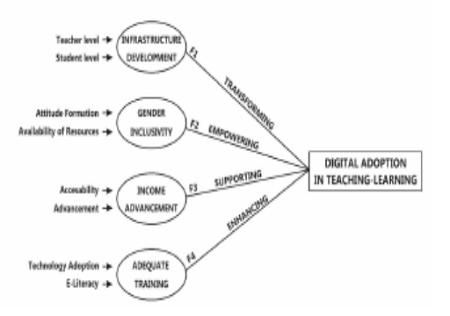


Indian Journal of Science and Technology
Year: 2023, Volume: 16, Issue: 22, Pages: 1657-1664
Original Article
Lijo P Thomas1*, Juby Thomas2, Ritesh Choudhary3
1PhD Scholar, Himgiri Zee University, Dehradun
2Assistant Professor, Department of media studies, Kristu Jayanti College, Bengaluru, India
3Associate Dean, School of Journalism and Mass Communication, Himgiri Zee University, Dehradun, India
*Corresponding Author
Email: [email protected]
Received Date:08 March 2023, Accepted Date:21 May 2023, Published Date:07 June 2023
Objectives: The purpose of this study is to investigate the perspectives of academicians regarding the current status of digital learning adopted at various higher education institutions in South India. It also seeks to identify the challenges they encounter while transitioning from traditional offline methods to online or blended modes of education. Methods: A survey was administered to faculty members, and statistical techniques including percentage and factor analysis were employed to analyse the data. The dataset comprised 344 responses collected by February 20th, 2023, and the survey covered two colleges from each of the five South Indian states, representing government, aided, and self-financing institutions. Findings: A significant finding from the study is that 44.2% of respondents agree and 36% strongly agree that one of the main challenges in digital classrooms is to capture students’ attention. As a result, 49.4% of respondents believe that a blended learning approach is more suitable than complete digitization. Only 0.9% of respondents reported that they never experienced any difficulties while adopting technology in a classroom, 36.3% of academics strongly agree and 48.3% agreed to the fact that more FDPs and refresher courses pertaining to technical skill advancement are the need of the hour to tackle this educational transformation. Based on the challenges observed, the current study also proposes a 4-factor adaptability model to the higher education institutions to adopt for providing a better learning experience. Novelty: The study emphasizes the significance to identify the needs of academicians for adapting to the current educational transformation. There is a lack of literature on teachers’ perceptions of higher education’s adaptability to online education beyond the pandemic. The study recommends effective policy, ongoing technical skill enhancement training, and a blended learning approach as solutions to address the challenges associated with online education. Additionally, the study emphasizes the importance of incorporating blended learning or online courses into thecurriculum, as highlighted by the latest national education policy.
Keywords: Digital learning; academician’s challenges; COVID 19; blended learning; ICT adoption in higher education; South India; NEP 2020
© 2023 Thomas et al. This is an open-access article distributed under the terms of the Creative Commons Attribution License, which permits unrestricted use, distribution, and reproduction in any medium, provided the original author and source are credited. Published By Indian Society for Education and Environment (iSee)
Subscribe now for latest articles and news.